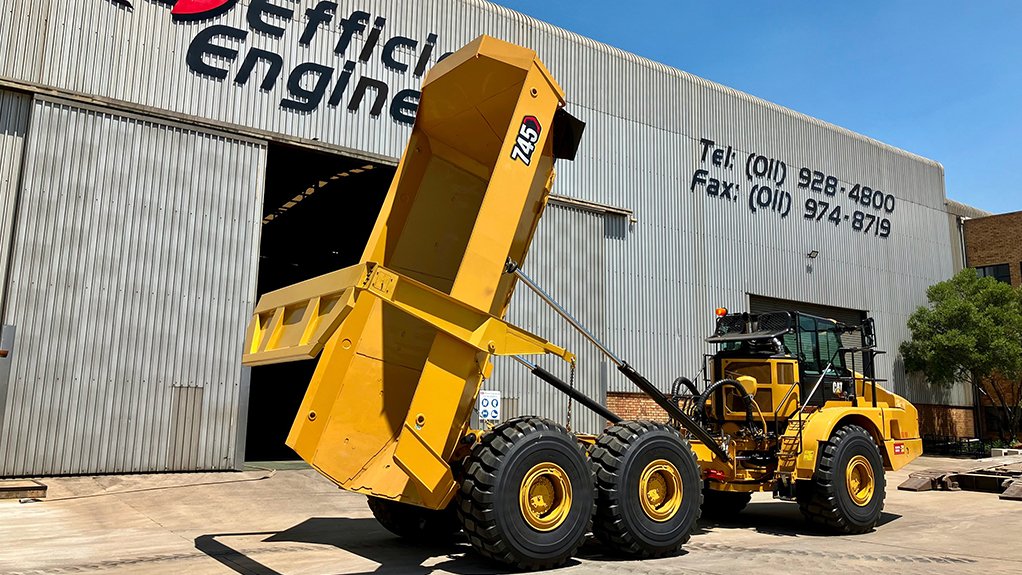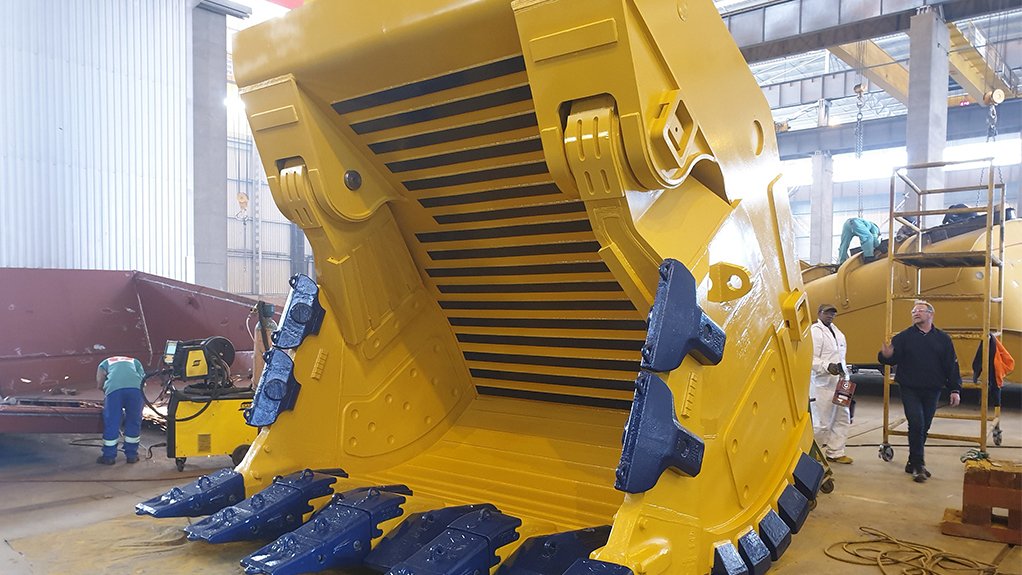While the local economic climate weighs heavily on many manufacturers, specialist fabrication company Efficient Engineering’s order book has never looked better.
“We’ve never experienced such an order book at the beginning of a financial year. Our financial year started in March and we have already secured 50% of our budgeted turnover,” Efficient Engineering COO Gary Colegate tells Engineering News.
Established in 1968, the company has grown to occupy facilities covering 21 000 m2 in Germiston, Gauteng, where it manufactures mining, materials handling, minerals processing and petrochemicals and oil and gas equipment on behalf of original-equipment manufacturers (OEMs).
Since its founding, Efficient Engineering has weathered several global economic downturns, from the economic crisis in the 1970s – following the oil embargo imposed by Arab oil producers against the US – to the 2009 financial crisis. Today, the company is operating in a business climate hindered by the negative global economic impact of the Covid-19 pandemic and the ongoing Russia-Ukraine war, in addition to South Africa’s energy crisis and recent greylisting by global financial crime watchdog the Financial Action Task Force (FATF).
Colegate says the company’s sustainability is the result of its dynamic management team, which is “in touch with the markets”.
“We are quick to react to external influences on our business. We’ve got a very shallow structure, which makes us really lean and flexible enough to be able to counter threats to our business. And, of course, we’ve also complemented our traditional markets through our diversification programme, which was implemented about 12 years ago.”
At the time, Efficient Engineering introduced its pressure vessels manufacturing business, which has proved to be “immensely successful”, elaborates Colegate.
He highlights that the cyclical nature of the petrochemicals and mining industries tend to complement each other, as they do not coincide, giving Efficient Engineering confidence in the sustainability of its business.
Meanwhile, the increased intensity of loadshedding is threatening the sustainability of the local manufacturing sector, as companies absorb the financial blow of running backup power solutions, such as diesel generators, almost daily, increasing the cost of local manufacturing.
However, based in Tunny, Efficient Engineering has not been directly impacted on by loadshedding, says Colegate.
The manufacturer has had to contend with the occasional power outage, but has generators installed at its facilities with the capacity to meet the energy demands of its manufacturing processes for an extended period.
Manufacturing Demand
While it is expected that South Africa’s greylisting in February could cause a retraction in foreign direct investment as investors gravitate towards economies with less uncertainty, Efficient Engineering does not have the slightest worry at present.
Financial institution Investec group compliance head Thulani Kunene says: “Our view is that the greylisting by the FATF was anticipated and largely priced in by the financial markets and, therefore, on its own it does not present a significant risk to the stability of the South African economy. There are other factors such as the low growth forecast and energy crisis that make the timing of the greylisting unfortunate.”
Colegate agrees, adding, however, that if government does not resolve the outstanding 15 actions (linked to eight strategic actions) by 2025, “then that could be detrimental for our economy going forward”.
While Efficient Engineering does not export the equipment it manufactures directly, as it is contracted to produce OEM products, such as truck bodies and excavator buckets, the greylisting could impact on whether certain countries opt to procure products made in South Africa.
Locally, there is increasing demand for truck bodies from the mining industry, owing to growing demand for coal in Europe on the back of the energy constraints created by the sanctions imposed on Russia, condemning the Russia-Ukraine war.
“Unfortunately, South Africa can’t get coal out of the country quick enough, because of infrastructure and port constraints. And, of course, the rand:dollar exchange rate is also favouring commodity exports. Commodity prices have stabilised and the predictions are that prices will increase over the short term.”
Although Efficient Engineering is not struggling with rising energy costs, it is navigating the inflation of other input costs, such as labour and raw materials.
“Procuring material has also been an issue because of the Russia-Ukraine war, which has had a detrimental effect, specifically on the supply of the high-grade materials that we import from Europe. Where our prices have needed to increase because of these input costs, our customers have been understanding, as long as we keep it within reasonable levels,” explains Colegate.
To reduce input costs, Efficient Engineering committed R59-million in the previous financial year to improve its efficiency, turnaround and quality control. This includes addition of a state-of-the-art CNC floor boring machine, one of the biggest of its kind in South Africa, to its expanded machine shop as well as improved automated welding technology and supplementary equipment.
“We are concentrating extensively on automation to help reduce input costs, but we are also cognisant of the fact that we are an employer, and we try to assist with South Africa’s employment problems. But if we want to make significant strides in reducing input costs, we have to look at automation in certain areas,” concludes Colegate.
Edited by: Zandile Mavuso
Creamer Media Senior Deputy Editor: Features
EMAIL THIS ARTICLE SAVE THIS ARTICLE
ARTICLE ENQUIRY
To subscribe email subscriptions@creamermedia.co.za or click here
To advertise email advertising@creamermedia.co.za or click here















